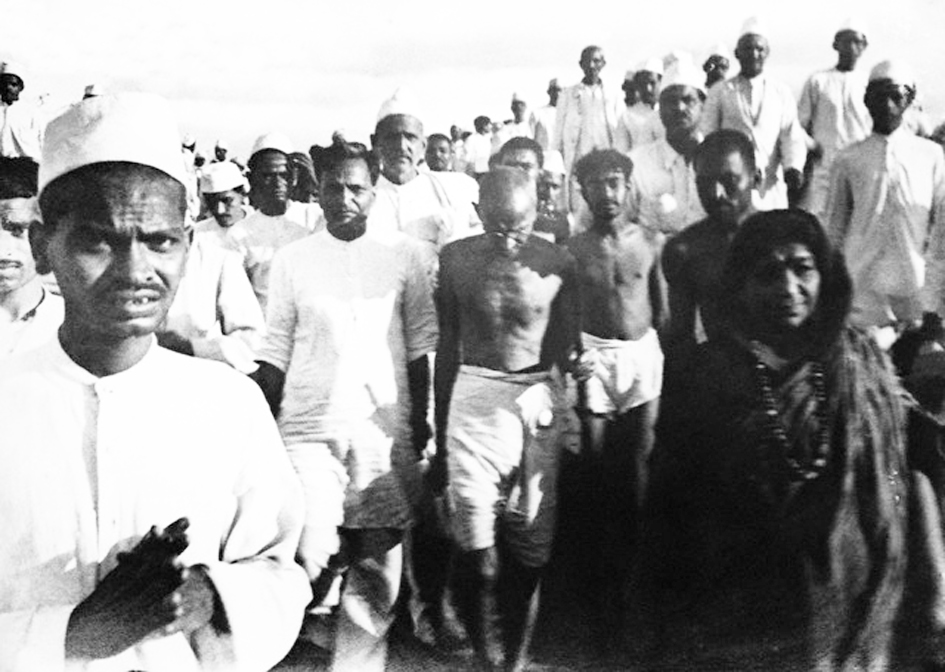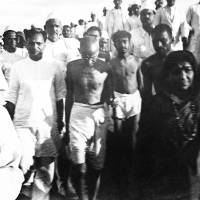Natives beaten down by police in India salt bed raid
By WEBB MILLER, United Press Staff Correspondent

DHARASANA, India, Wednesday, May 21, 1930 (UP) – Prayers said as white-clad volunteers knelt in the moonlight and an impassioned speech by the poetess-leader, Mrs. Sarojini Naidu, opened the mass attack of 2,500 independence demonstrators today on the Dharasana Salt Works.
The poetess, wearing a rough, homespun robe and soft slippers, but no stockings, exhorted her followers to the raid in which 260 of them were injured and which brought about her own arrest.
“Although Gandhi’s body is in prison, his soul goes with you,” she cried in an impassioned voice as she sent the volunteers to the attack.
The volunteers formed into columns, with their leaders carrying ropes and wire cutters. They advanced slowly for half a mile – a ghostly procession – toward the salt works.
The 400 police clutched their clubs and about 25 of them revealed their rifles as the volunteers approached. There were a few cheers and then the leaders who had ropes attempted to lasso the posts holding up the barbed wire, intending to uproot them. The police ran up and demanded that they disperse. The volunteers refused.
Police charged, swinging their clubs and belaboring the raiders on all sides. The volunteers made no resistance. As the police swung hastily with their sticks, the natives simply dropped in their tracks.
Less than 100 yards away I could hear the dull impact of clubs against bodies. The watching crowds gasped, or sometimes cheered as the volunteers crumpled before the police without even raising their arms to ward off the blows. With almost unbelievable meekness they submitted to the clubbing and were carried away by their comrades who had collected a score of stretchers.
As the attacks continued, stretcher bearers were overworked. Other volunteers joined, using blankets as stretchers for the injured who were falling so fast that the volunteers established a clearing station a hundred yards from the pans.
I counted 42 injured lying on the muddy ground and a few others who were unconscious and writhing in pain.
After police had driven the raiders back, leaders altered their tactics and started stretching themselves on the ground or sitting in front of the police as closely as they could press to the entanglements. They were warned repeatedly by police, who then struck the men sitting in front of them. The volunteers who were hit simply reeled over on the ground – without making a cry or an effort to defend themselves.
Police also altered their tactics and started dragging the volunteers about 100 yards away to the edge of the ditch, where I stood. Some of the volunteers were hurled bodily into the ditch, splashing mud on everyone nearby.
The man who were so treated did not make a sound but submitted without protest or resistance. Sometimes police became angered and in a few instances they kicked men who were sitting before the entanglements. The crowd of volunteers massed a short distance away and taunted the police, although their leaders implored them to remain silent.
Mrs. Naidu directed operations from a point near the front of the struggle. She commented briefly on the raid and promised to make a statement after it was over. A few minutes later a British official, accompanied by three police, approached and placed her under arrest.
As the heat increased at noon the operations slackened. About 20 doctors and nurses were working over prone men stretched in the shade of a mango tree in a nearby thicket.
Doctor Shah said he had treated about 200, mostly for minor injuries. I counted more than 200 in a nearby shack and saw more arriving.
Many of the volunteers were college students or clerks from all part of Gujerat. Many spoke English. I was the only American correspondent at Dharasana and they talked freely to me but I was refused auto transportation by native drivers because I wore foreign clothes, which have been boycotted.




























